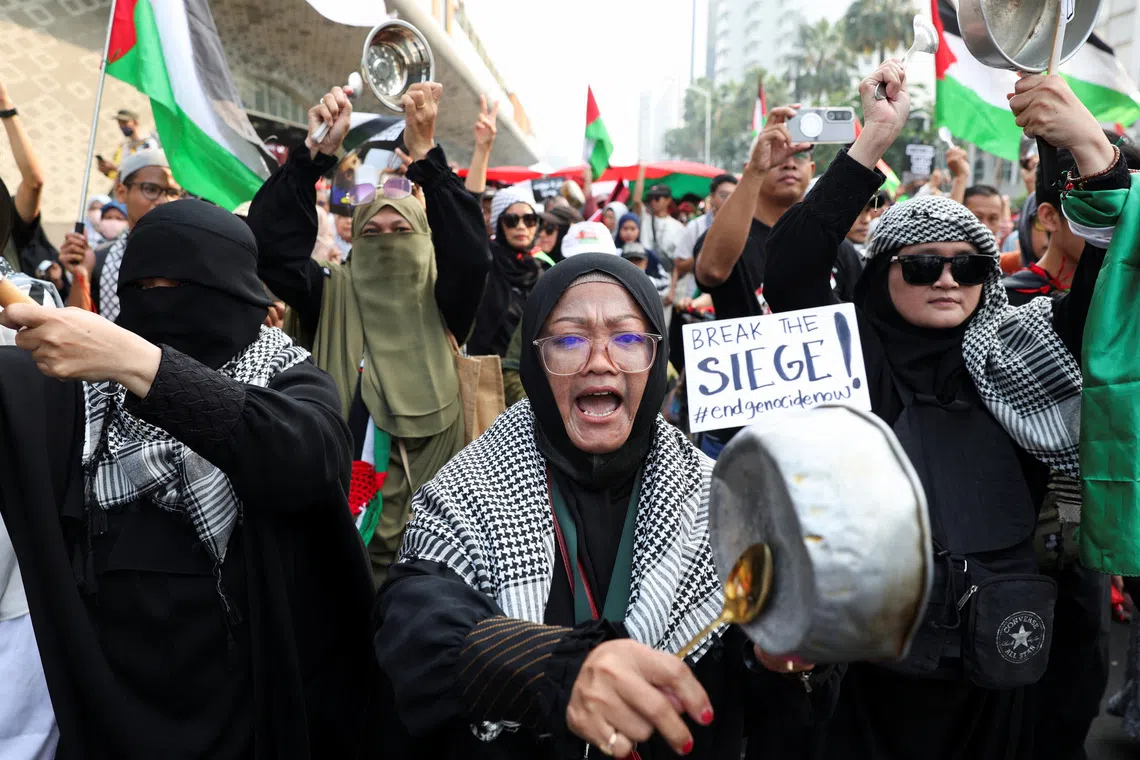Indonesia to bar Israeli gymnasts amid rising tensions over Palestine
Sign up now: Get insights on Asia's fast-moving developments

People react during a "Stop Starving Gaza Now" protest outside the US embassy in Jakarta, Indonesia, on July 27.
PHOTO: REUTERS
Follow topic:
- Indonesia has denied visas to Israeli gymnasts for the World Championships in Jakarta, due to the ongoing Israeli-Palestinian conflict.
- The decision aligns with Indonesia's stance of not establishing relations with Israel until it recognises a sovereign Palestinian state.
- This action, supported by public sentiment and religious groups, reflects Indonesia's long-standing support for Palestinian rights and opposition to Israeli policies.
AI generated
JAKARTA – Indonesia has once again refused entry to Israeli athletes, this time denying visas to six gymnasts scheduled to compete in the World Artistic Gymnastics Championships in the capital Jakarta later in October.
The decision highlights Jakarta’s longstanding support for Palestinian rights and comes amid growing public attention on the ongoing conflict in Gaza, where violence has intensified in recent months. It follows a ceasefire agreement between Israel and Hamas
Mr Yusril Ihza Mahendra, Coordinating Minister for Law, Human Rights, Immigration and Correctional Institutions, said on Oct 9 that the directive to bar the athletes from participating in the competition, which will be held from Oct 19 to 25, came from President Prabowo Subianto.
He said the government’s stance was consistent with the Indonesian leader’s previous statements, including his speech at the United Nations in September, in which he “strongly condemned” Israel for “continuously committing atrocities and barbarity against the Palestinian people, especially in Gaza”.
Mr Yusril stressed that Indonesia would not establish diplomatic or other official relations with Israel until it recognised Palestine.
He said: “So the Indonesian government will not issue visas to Israeli athletes who intend to come to Jakarta.
“And the Indonesian government firmly holds the position that it will not have any contact with Israel until Israel recognises the existence of a free and sovereign Palestinian state. Only then will the Indonesian government begin to open diplomatic relations with Israel and also engage in other normal international relations.”
In July, the Israeli Gymnastics Federation had said it was assured by Indonesian officials that the team would be welcome at the championships, highlighting a reversal from that earlier position.
Eighty-six countries have registered for the championships, with more than 600 athletes and nearly 1,500 participants, including officials and support staff. The competition, which will be hosted by a South-east Asian nation for the first time, will reportedly feature top international talent such as Brazil’s world champion Rebeca Andrade and the Philippines’ Carlos Yulo.
This is not the first time Indonesia has opposed Israel’s participation in international sporting events. In 2023, the country lost its right to host the Fifa Under-20 World Cup after refusing to allow Israel’s youth team to compete, following protests by local officials and religious groups.
Despite then President Joko Widodo’s call to separate sports from politics, the government did not issue visas to the Israeli players.
In 2015, the Indonesian Ulema Council (MUI) urged the government to bar the Israeli gymnastics team ahead of the Asia-Africa Summit in Jakarta and Bandung. The team ultimately did not attend.
Anti-Israel sentiment runs deep in the world’s largest Muslim-majority nation of 280 million people, shaping government policy and public attitudes towards global sporting events. Observers say Indonesia’s refusal to engage with Israel is rooted in both historical solidarity with Palestine and domestic political sensitivities.
Indonesians generally see the establishment of Israel and its occupation of Palestinian territories, including the Gaza Strip, as a violation of Palestinians’ right to self-determination. The Palestinians’ opposition to colonialism also reflects its own historical experience under Dutch rule.
For Jakarta, refusing Israeli athletes is not only a diplomatic stance. It is a continuation of a broader principle: defending Palestinian rights and asserting national sovereignty.
Mr Yusril said the decision reflects widespread public sentiment.
In recent days, netizens, religious groups, political parties, local officials and Members of Parliament have voiced near-unanimous opposition to Israeli participation in the competition, citing both humanitarian and political concerns.
“This government is also in line with the expectations of the entire people. As we can see, there is strong rejection,” he added.
The MUI had earlier urged the government to block the athletes’ entry.
“Freedom is the right of every nation. Colonisation must be abolished because it is incompatible with humanity and justice,” said its secretary-general Amirsyah Tambunan.
MUI’s international relations and cooperation chairman Sudarnoto Abdul Hakim warned that sporting events could stoke public anger.
“Do not let events such as gymnastics competitions cause public anger and undermine the trust of people who have long supported the Palestinian struggle,” he said.
Jakarta Governor Pramono Anung echoed the sentiment, stressing that Israeli athletes would not be permitted to compete under his administration.
“Regarding Israeli athletes coming to Jakarta, of course, as governor of Jakarta in such a situation I certainly would not allow it,” he said, adding that their participation amid ongoing violence in Palestine would provoke strong public backlash.
Parliament has also weighed in.
Ms Kurniasih Mufidayati, deputy chair of the parliamentary commission overseeing sports, framed the rejection as an issue of humanitarian diplomacy. She warned that sports should remain a domain of peace, not propaganda for occupying powers.
“We must not be part of Israel’s sportswashing agenda that uses sports to cover up its crimes against the Palestinian people,” Ms Kurniasih added.
Mr Yusril said the decision was coordinated across several ministries under the Coordinating Ministry for Legal Affairs, ensuring a unified government stance.
Indonesia’s Gymnastics Federation, which had previously submitted sponsorship letters for the Israeli athletes, has since withdrawn them after being informed of the government’s position.


